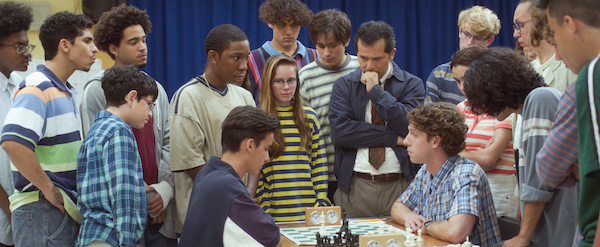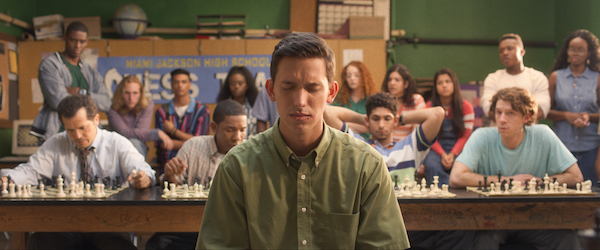Modest but effective drama with a worthy message from director and actor John Leguizamo.

Set in Miami in 1998, Critical Thinking tells the true story of underprivileged high school students who beat the odds to win a national chess tournament. Directed with earnest sincerity by John Leguizamo, it’s the kind of movie that embraces genre expectations. And like the kids it portrays, it works hard to reach its happy ending.
Leguizamo plays Mr. “T” Martinez, a beleaguered teacher fighting on several fronts to keep his elective course—ostensibly about critical thinking but in reality lessons for his chess team—alive. First he has to overcome the indifference of his students, almost all Latinx and black kids from lower-class homes. Then he has to battle bureaucracy in the form of hard-bitten principal Kestel (Rachel Bay Jones). Finally he has to convince other school districts and eventually states that his team deserves to compete against wealthier schools.
It could have been a showy role, but Leguizamo tamps down his typical energy, letting his character’s doubts emerge along with his combativeness. The actor directs in a similar manner, staging and framing his cast to focus on their performances, trusting them to animate the bare-bones script by Dito Montiel.

Production values are basic: a few period cars and lots of late nineties pop music. Cinematographer Zach Zamboni offers an occasional tracking shot or surprise angle, but the visuals are straightforward, with a documentary realism and television simplicity.
The plot to Critical Thinking is as predictable as any sports movie: aspirations, setbacks, victory, with incidental character development. That the film succeeds as well as it does is due in largely to its young performers, who bring a freshness and vitality to predictable roles.
Critical Thinking was developed by executive producer Carla Berkowitz, who met with Martinez and his students as they were competing in the 1990s. Their cooperation gives the film its authenticity, but may have also sanded off rough edges. To their credit, the movie is tougher than you might expect, even if it resolves some subplots too easily.
Among the competitors, Jeffry Batista makes a strong impression as Marcel, a Cuban émigré with uncanny abilities. And Jorge Lendeborg, Jr. does the best he can as “Ito,” a victim of drug violence.
Critical Thinking was supposed to premiere at this year’s SXSW before COVID-19 upended the film industry. Its real-life angle and Leguizamo’s participation might have won the project a small theatrical window followed by a streaming deal. Now it’s another unsung casualty, left in the same limbo as releases from major studios. Critical Thinking is honest and moving but not exceptional. It’s an example of the kind of middlebrow festival feature that may not make as much financial sense in the future.


